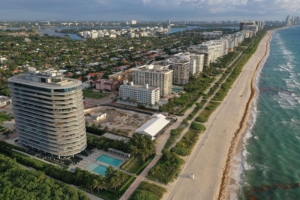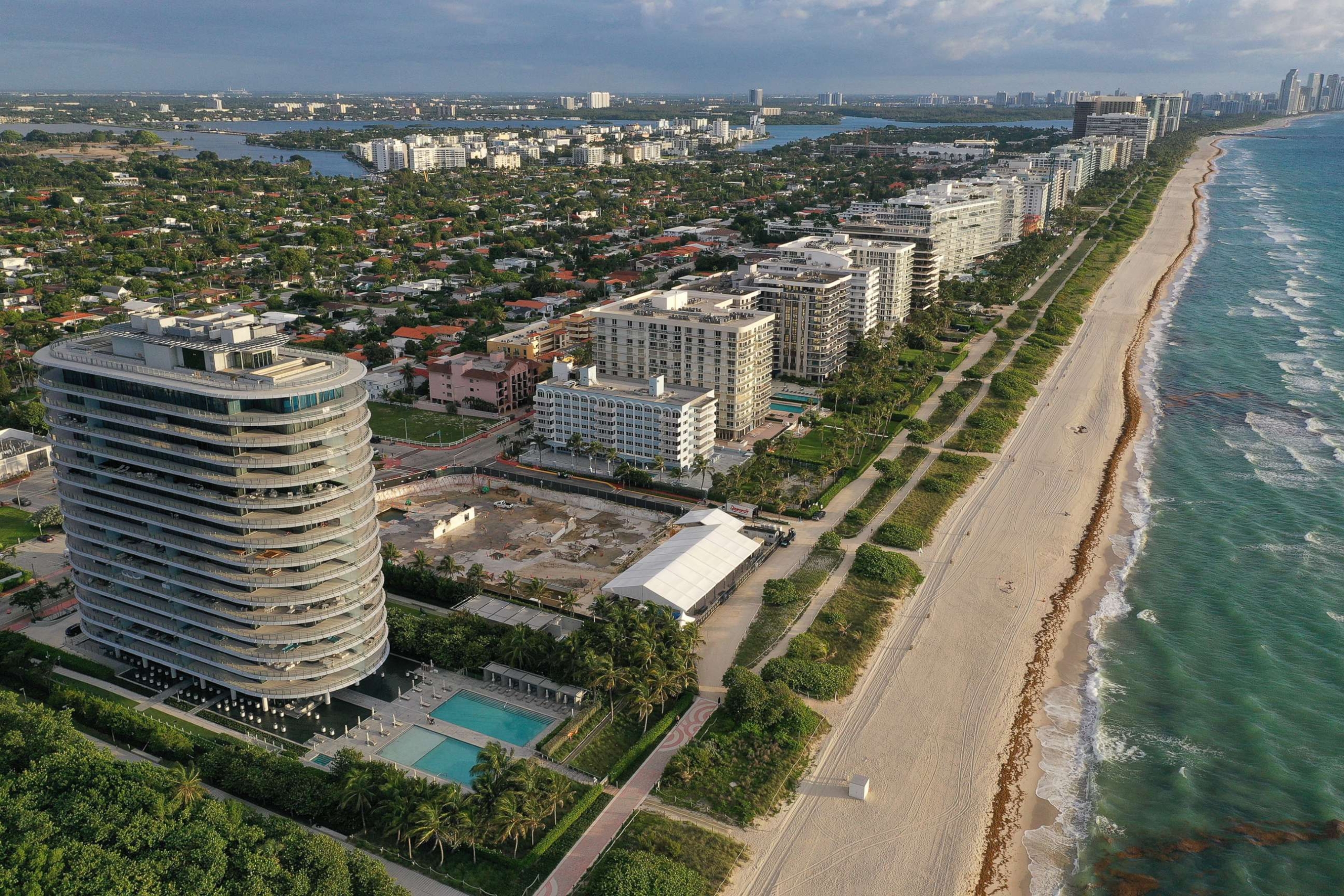South Florida's Retail Renaissance: Major Brand Expansions Signal Economic Growth Surge
South Florida's commercial real estate landscape is experiencing an unprecedented transformation as national retailers and local businesses accelerate their expansion plans throughout the region. With experts predicting at least a 10% rise in commercial real estate activity and steady retail growth projected for 2025, the latest wave of lease signings and store openings reflects the area's robust economic momentum.
The recent announcements spanning from Dania Beach to Miami Beach showcase how diverse retail segments are capitalizing on South Florida's favorable market conditions. From fast-casual dining giants to luxury fashion boutiques, businesses are strategically positioning themselves to capture the region's growing consumer base and tourism influx.
Dania Pointe Emerges as Premier Mixed-Use Destination
Kimco Realty's master-planned Dania Pointe development continues to attract premium retailers, solidifying its position as a premier shopping and entertainment destination. The 102-acre mixed-use complex, strategically located at the intersection of I-95 and Stirling Road, has secured four significant new tenants that reflect current retail expansion trends.
Shake Shack's decision to establish a 2,800-square-foot drive-thru location at Dania Pointe aligns with the brand's aggressive expansion strategy. The premium burger chain's choice to include drive-thru capabilities reflects evolving consumer preferences for convenience-focused dining experiences that gained prominence during the pandemic and continue to drive location decisions.
The addition of Face Foundriė, a specialized facials center occupying 1,500 square feet, represents the growing wellness and beauty services sector that has become increasingly important in mixed-use developments. This 'experience-driven retail' trend demonstrates how property developers are diversifying their tenant mix beyond traditional shopping and dining.
Rowan's 936-square-foot ear piercing center and hypoallergenic jewelry store represents the emerging trend of specialized beauty and personal care services that cater to health-conscious consumers. The brand's focus on hypoallergenic products addresses growing consumer awareness about product safety and inclusivity.
Perhaps most significantly, Lululemon's decision to launch a summer pop-up at Dania Pointe reflects a strategic testing approach that many premium brands are adopting. This trend continues in 2025 as brands expand their brick-and-mortar presence to foster deeper customer connections and create interactive experiences.
Under CEO Conor Flynn's leadership, Kimco has developed Dania Pointe into a comprehensive lifestyle destination featuring approximately 1 million square feet of retail, restaurants, and entertainment venues, complemented by Marriott and AC hotels, residential units, and the Spirit Airlines headquarters.
Banking Sector Adapts to Changing Demographics
Ocean Bank's strategic relocation within Miami-Dade County illustrates how financial institutions are adapting their physical presence to serve evolving customer needs and demographic shifts. The bank's move from 8700 West Flagler Street to a 4,200-square-foot space at 7700 West Flagler Street in the Midway Crossings shopping center represents more than a simple relocation—it reflects strategic positioning within a higher-traffic retail environment.
This eastward migration of approximately one mile positions Ocean Bank, under CEO Agostinho Alfonso Macedo's leadership, within Sterling Organization's expansive 668,000-square-foot Midway Crossings development. The integration of banking services within established shopping centers has become increasingly common as financial institutions seek to maximize customer touchpoints and convenience.
The appointment of Otany Martinez as branch manager for the new location signals Ocean Bank's commitment to maintaining personalized customer relationships while adapting to contemporary retail banking trends that emphasize accessibility and community integration.
Coworking Evolution Reflects Hybrid Work Trends
Venture X's expansion and relocation within Doral demonstrates the continuing evolution of the coworking sector, which has adapted significantly since the pandemic reshaped workplace dynamics. The company's decision to lease 21,000 square feet at 8400 Northwest 33rd Street—an increase of 2,500 square feet from their previous 8350 Northwest 52nd Terrace location—indicates growing demand for flexible workspace solutions.
The new location within the 367,000-square-foot Westside Plaza, owned by Denver-based private equity firm Ascentris, positions Venture X to capitalize on the hybrid work model that has become permanent for many businesses. The expanded footprint suggests increased demand for collaborative spaces, private offices, and meeting facilities that support the flexible work arrangements now standard across multiple industries.
This expansion aligns with broader commercial real estate trends showing that coworking spaces are becoming essential components of mixed-use developments, providing businesses with scalability and workers with professional environments closer to residential areas.
Fashion and Culinary Sectors Drive Lincoln Road and Wynwood Growth
The retail landscape in Miami's most iconic districts continues to evolve with distinctive additions that reflect both local character and international influences. Ché by Chelsey's establishment on Lincoln Road represents the ongoing revitalization of this historic shopping corridor, while Niño Gordo's Wynwood debut showcases the neighborhood's position as a culinary innovation hub.
Ché by Chelsey, founded by Chelsey Comfort in 2016, secured a strategic 675-square-foot space at 830 Lincoln Road through a two-year lease arrangement. The upscale women's fashion brand's migration from Brickell City Centre to Lincoln Road reflects the pedestrian-friendly corridor's renewed appeal to boutique retailers seeking to capture both tourist traffic and local clientele.
Under the leadership of Stephen Bittel and Mindy McIlroy, Miami Beach-based Terranova Corporation continues to curate a diverse tenant mix that balances luxury retail with accessible fashion options. Lauren Robbins' representation of the landlord in this transaction demonstrates the specialized expertise required to navigate Lincoln Road's unique retail environment.
Meanwhile, Wynwood's transformation into an international dining destination received another boost with Niño Gordo's inaugural U.S. location. The Asian-fusion grill restaurant, led by acclaimed chefs Germán Sitz and Pedro Peña, brings their Buenos Aires success story to a 1,900-square-foot space at 112 Northwest 28th Street.
The restaurant's expansion from Argentina to Miami reflects Wynwood's growing reputation as a testing ground for innovative culinary concepts that blend international influences with local flavors. The Miculitzki family's Miami-based Block Capital Group's ownership of the property demonstrates local investment in the neighborhood's continued evolution as a creative and culinary hub.
Market Implications and Future Outlook
These diverse lease signings and business openings reflect several key trends shaping South Florida's commercial real estate landscape. According to Goldman Sachs, South Florida is one of only two US markets expected to see price appreciation, which continues to attract both national retailers and local entrepreneurs.
The variety of businesses—from fast-casual dining and luxury fashion to coworking spaces and specialized beauty services—demonstrates the market's resilience and diversity. Retailers are focusing on strengthening digital commerce and enhancing the omnichannel experience as top growth opportunities, creating more holistic and personalized consumer experiences.
The integration of drive-thru capabilities, pop-up retail concepts, and experience-driven services reflects how businesses are adapting to post-pandemic consumer preferences while capitalizing on South Florida's robust economic fundamentals. The region's combination of year-round tourism, growing population, and business-friendly environment continues to attract investment across multiple retail sectors.
Insights
What makes Dania Pointe attractive to major retailers like Shake Shack and Lululemon?
Dania Pointe's strategic location at I-95 and Stirling Road, combined with its mixed-use format including hotels, residential units, and the Spirit Airlines headquarters, creates a built-in customer base and high traffic volume that premium retailers find attractive for both testing new concepts and establishing permanent locations.
Why are banks like Ocean Bank relocating within shopping centers?
Financial institutions are increasingly positioning branches within retail environments to maximize customer convenience and foot traffic. This strategy allows banks to serve customers who are already shopping or dining, making banking services more accessible and integrated into daily routines.
How do coworking space expansions like Venture X reflect broader workplace trends?
The growth in coworking spaces reflects the permanent shift toward hybrid work models, where businesses need flexible workspace solutions and employees seek professional environments closer to home. The 2,500-square-foot expansion indicates growing demand for collaborative spaces and private offices.
What does the mix of international and local brands opening in Wynwood and Lincoln Road indicate about Miami's retail market?
This diverse mix demonstrates Miami's appeal as both a testing ground for international brands entering the U.S. market and a destination for established local businesses seeking to expand. The combination creates a unique retail ecosystem that serves both tourists and residents.
How do pop-up retail concepts like Lululemon's summer location benefit both brands and developers?
Pop-up locations allow brands to test market demand and customer response with lower risk and investment, while developers can fill spaces temporarily and potentially convert successful pop-ups into permanent tenants, creating a win-win scenario for market testing and space utilization.
What role do specialized services like Face Foundriė and Rowan play in modern retail developments?
These specialized beauty and wellness services represent the "experience economy" trend where consumers seek personalized services and unique experiences rather than just products. They help differentiate shopping centers from online retail and create destination appeal that drives repeat visits.







